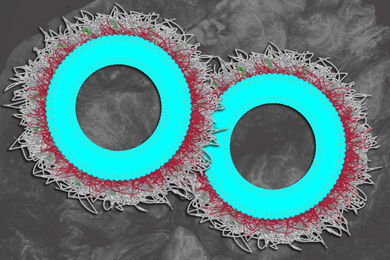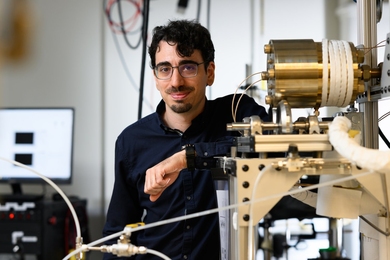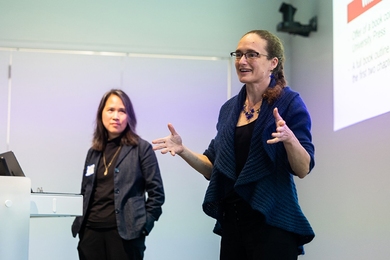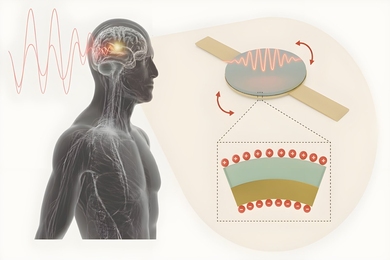Chancellor Cynthia Barnhart announced today that Candis Callison SM ’02 PhD ’10, associate professor in the Graduate School of Journalism at the University of British Columbia Vancouver, will be the guest speaker at MIT’s 2018 Investiture of Doctoral Hoods.
Callison’s participation marks the fourth consecutive year that MIT has welcomed a guest speaker to the ceremony. “Professor Callison is an accomplished thought leader in science communication, having used scholarship to bring context and understanding to the distinct belief systems that influence public opinion on issues related to science and technology,” said Chancellor Barnhart, host of the ceremony. “Hearing her speak about her guiding principles and her journey from journalist to graduate student to public intellectual will be an inspiration to our newest doctoral candidates at this important time in their lives.”
The speaker selection process engages MIT faculty and doctoral students to identify an alum whose acumen and professional and personal experience will resonate with new PhDs and ScDs as they embark on their careers. Eric Grimson, chancellor for academic advancement, chairs the Commencement Committee. “It is exciting to collaborate with our students and faculty, who continue to identify alumni from diverse disciplines and personal backgrounds and whose paths exemplify ways to use the MIT doctorate in rewarding pursuits,” he said. “We are honored to welcome Professor Callison home to campus on June 7.”
Born and raised in Vancouver, Callison is a member of the Tahltan Nation, an Indigenous people located in northwestern British Columbia, Canada. Prior to graduate school, she worked as a journalist for the Canadian Broadcasting Corporation (CBC) and CTV News. While at CTV, she was the original host and co-creator of "First Story," the first news and current affairs series on Indigenous issues to be broadcast nationally in Canada and later syndicated to the Aboriginal Peoples Television Network (APTN).
After nearly eight years in industry, Callison came to MIT to pursue her master’s degree in comparative media studies, where she concentrated on issues related to visual culture, media convergence, and digital representations of the environment. Subsequently, she earned her PhD in history, anthropology, and science, technology, and society. Her doctoral research focused on how Americans learn about climate change by examining the work and experiences of five distinct social groups, including science journalists, climate scientists involved in public and policy discourse, Inuit leaders, corporate responsibility advocates, and evangelical Christians. This research was later incorporated into a book, "How Climate Change Comes to Matter: The Communal Facts of Life" (Duke University Press, 2014).
Callison joined the faculty at the University of British Columbia Graduate School of Journalism in 2009, leading and team-teaching a number of courses, including Media Ethics and Leadership, New Media and Society, Science and Environment Journalism, Anthropology of Science and Technology, and Feminist and Postcolonial Critique and Journalism in a Digital Age.
Callison is involved in several ongoing collaborative research projects. She leads a research team on Arctic Journalism, launched in 2014, that studies changes to professional norms, practices, and standards for Canadian Arctic journalists working in an era of environmental change and global audiences. Other projects, which are funded by the Canadian Media Research Consortium, include a study of gender, race, colonialism, and journalism that will result in a 2018 co-authored book for McGill-Queens University Press with UBC colleague Mary Lynn Young. A second project investigates how social networking technologies are being used by First Nations individuals and communities in Canada for social engagement, self-representation, and governance. A third involves the Social Media Advanced Research, Teaching and Training Lab (SMARTT Lab), an interdisciplinary center at the Journalism School dedicated to understanding the interplay between social networks, the media, and public discourse.
Currently, as an associate professor and chair of the Bachelor of Media Studies Program, Callison’s research and teaching focus on changes to media practices and platforms, journalism ethics, the role of social movements in public discourse, and understanding how issues related to science and technology become meaningful for diverse publics. Next year, Callison will be the Pathy Distinguished Visitor in Canadian Studies at Princeton University.
Callison is a regular contributor to "Media Indigena," a weekly Indigenous current affairs podcast, funded by listeners. She was also named to Open Canada’s 2018 list of Indigenous Twitterati.
The 2018 Investiture of Doctoral Hoods will take place on June 7 at 10 a.m. in the Johnson Athletics Center Ice Rink. The ceremony is open to family and friends of doctoral candidates; no tickets are required.






